Living in Evangelista, Makati, I'd rush to my favorite carinderia every morning after work, drawn by the sizzling sounds and incredible aroma of Longsilog being prepared. The tita behind the counter knew my order by heart: extra garlic rice, please!
Years later, living somewhere else and missing those mornings terribly, I recreated this beloved breakfast in my own kitchen. This recipe brings together longanisa (sweet Filipino sausage), sinangag (fragrant garlic fried rice), and perfectly runny fried eggs into one satisfying plate.
It's become my go-to comfort breakfast, and I'm excited to share the secrets I learned to make it just like that carinderia version I still dream about.
Jump to:
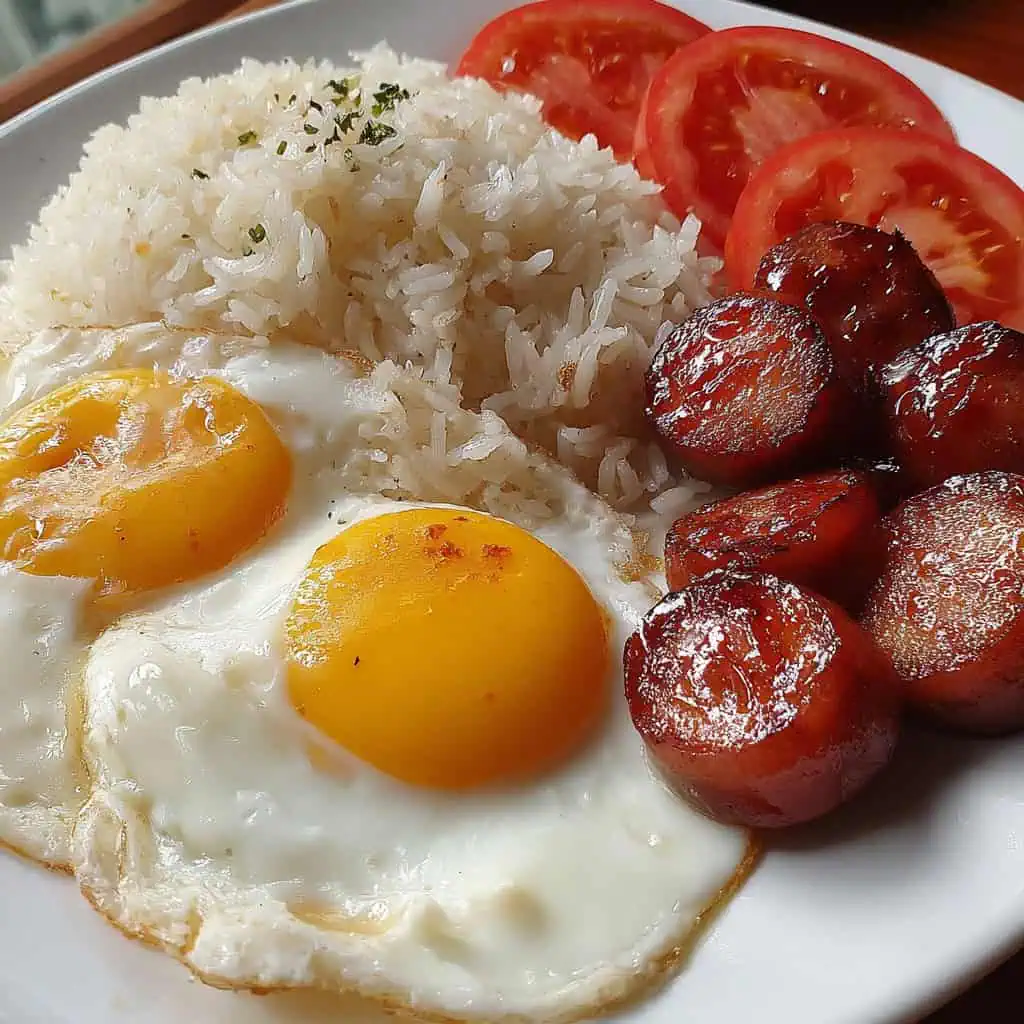
Why You'll Love This Recipe
You'll fall in love with this authentic Longsilog because it delivers restaurant-quality Filipino breakfast right in your own kitchen. The longanisa develops a beautifully caramelized exterior while staying juicy inside, the garlic rice is fragrant and perfectly seasoned, and the sunny-side-up eggs add that creamy richness that ties everything together.
It's a complete meal that's surprisingly easy to make, uses simple ingredients you can find at most grocery stores, and can be prepared in just 30 minutes. Plus, it's incredibly satisfying and will transport you straight to a Filipino breakfast table with every bite.
Ingredients
- 2 cups chilled white rice (day-old works best)
- 1-2 tablespoons minced fresh garlic
- ½ teaspoon salt
- 1 tablespoon cooking oil
- 5 pieces longanisa (Filipino sausage)
- 1 cup water
- 2-3 large eggs
- Fresh tomatoes or cucumber for serving (optional)
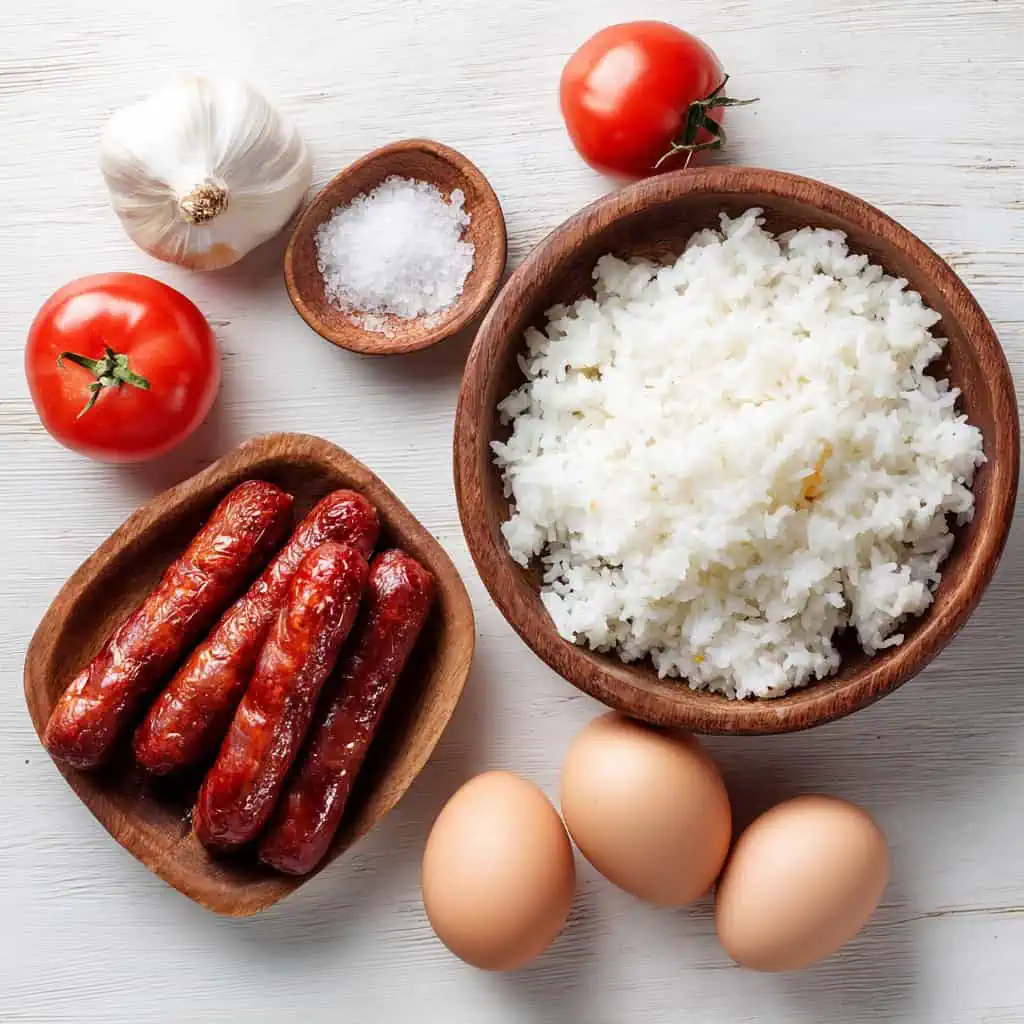
Day-old chilled rice is essential because it's drier and won't clump together when fried, creating that perfect texture. Fresh garlic provides the aromatic base that makes sinangag so irresistible. Longanisa is the star protein with its sweet and savory flavor profile that's distinctly Filipino.
The eggs add richness and protein, while fresh tomatoes provide a refreshing contrast to balance the rich, savory flavors.
Equipment
- Large frying pan or wok - For cooking the longanisa and achieving even browning
- Medium frying pan - For making the garlic rice and eggs simultaneously
- Spatula or wooden spoon - For stirring rice and flipping eggs without breaking yolks
- Tongs - For rolling longanisa safely while cooking
- Serving plates - For presenting your beautiful Longsilog
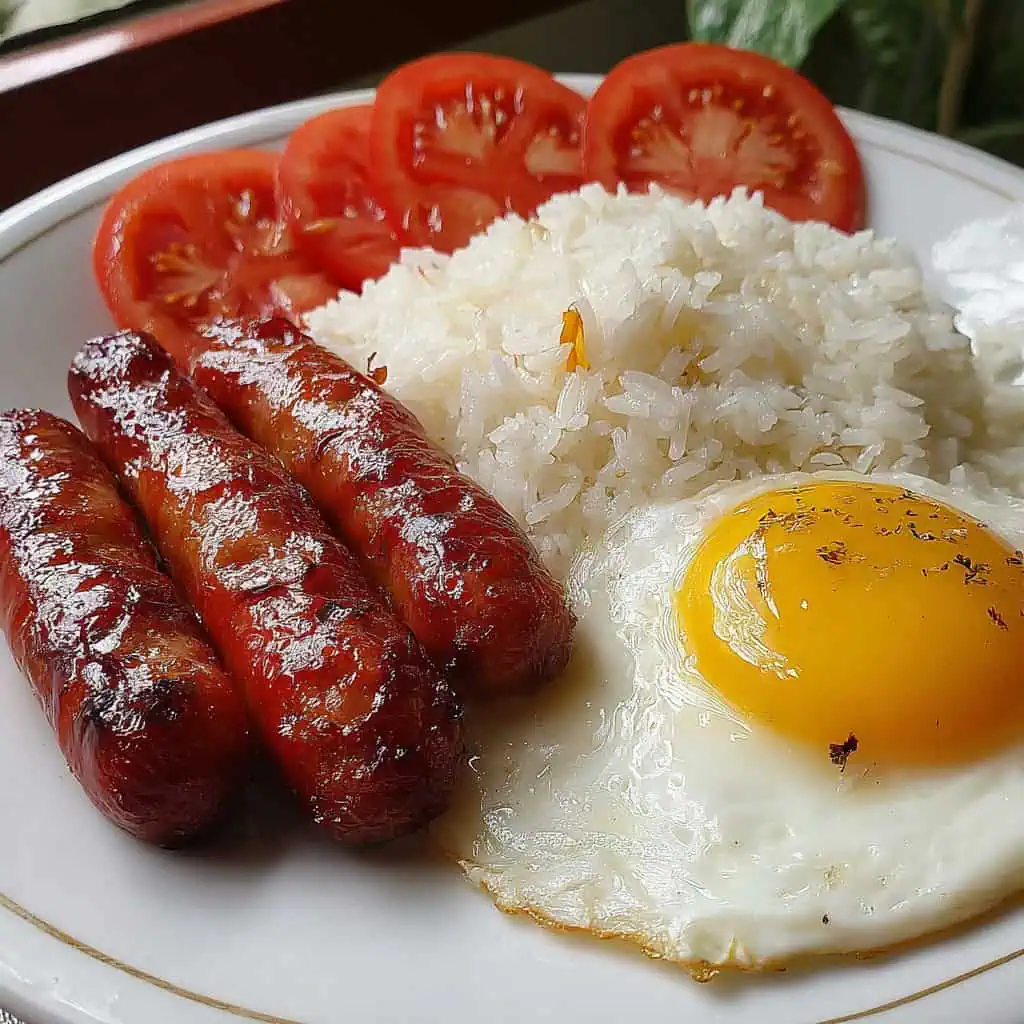
How To Make
- Start by heating your large frying pan over medium heat and add the longanisa with one cup of water. The water method is crucial here because it prevents the sausages from burning while ensuring they cook through completely.
- Bring the water to a boil and let it continue boiling while occasionally rolling the longanisa to ensure even cooking. This process takes about 8-10 minutes and allows the sausages to cook gently from the inside out.
- Once the water completely evaporates, you'll hear the sizzling change tone. Now the longanisa will start frying in their own rendered fat, which gives them that beautiful caramelized exterior. Continue rolling them for about 5 minutes until they develop a golden-brown, slightly crispy skin.
- While the longanisa finishes cooking, heat your second pan over medium heat and add the cooking oil. Add the minced garlic and cook until it turns golden brown and becomes fragrant and crispy, about 2-3 minutes.
- Add the chilled rice to the garlic and oil, pressing it down to break up any clumps. This initial pressing helps separate the grains and prevents them from sticking together in chunks.
- Stir the rice constantly to prevent scorching and ensure every grain gets coated with the garlic oil. Continue cooking for 5-7 minutes until the rice is heated through and has absorbed all the flavors.
- Season the rice with salt and continue cooking for another 5 minutes, stirring occasionally. The rice should be hot, fragrant, and lightly golden from the garlic oil.
- In the same pan used for longanisa (or a clean pan), fry your eggs sunny-side up. The key is to cook them over medium-low heat so the whites set completely while keeping the yolks runny and golden.
- Serve immediately by plating the garlic rice, placing the longanisa alongside, and topping with the fried eggs. Add fresh sliced tomatoes or cucumber on the side for a refreshing contrast.

Tips from Lola's Kitchen
- Always use day-old rice that's been refrigerated - fresh rice will become mushy and sticky when fried
- Don't skip the water-boiling step for longanisa; it ensures even cooking and prevents burning
- Keep the garlic moving in the pan to prevent it from burning and becoming bitter
- Press the rice down initially but then stir gently to avoid mashing the grains
- Cook eggs last so they're hot and runny when served
- If your longanisa seems to be browning too quickly, lower the heat and add a splash more water
Substitutions
- No longanisa? Use Chinese sweet sausage (lap cheong) or chorizo de Bilbao
- No day-old rice? Spread fresh rice on a baking sheet and refrigerate for 30 minutes
- Fresh garlic substitute: Use 1 teaspoon garlic powder (add it with the rice, not oil)
- Egg alternatives: Try scrambled eggs or even a fried egg with broken yolk for easier eating
- Oil options: Coconut oil or lard will add extra flavor depth
Troubleshooting
- Rice is too sticky: Your rice wasn't cold enough or you used too much oil - next time chill rice longer
- Garlic burned: Heat was too high - start over with lower heat and watch carefully
- Longanisa burst: Heat was too high during water stage - use medium heat throughout
- Rice is bland: Add more salt gradually and ensure garlic is properly browned first
- Eggs overcooked: Lower heat and cover pan briefly to cook whites without overcooking yolks
Storage & Reheating
- Refrigerate: Store components separately for up to 3 days in airtight containers
- Reheating rice: Add a splash of oil to a pan and reheat over medium heat, stirring frequently
- Reheating longanisa: Warm in a dry pan over low heat, turning occasionally
- Best practice: Cook fresh eggs when reheating rather than storing cooked ones
- Freezing: Rice and longanisa freeze well for up to 1 month, eggs should be cooked fresh
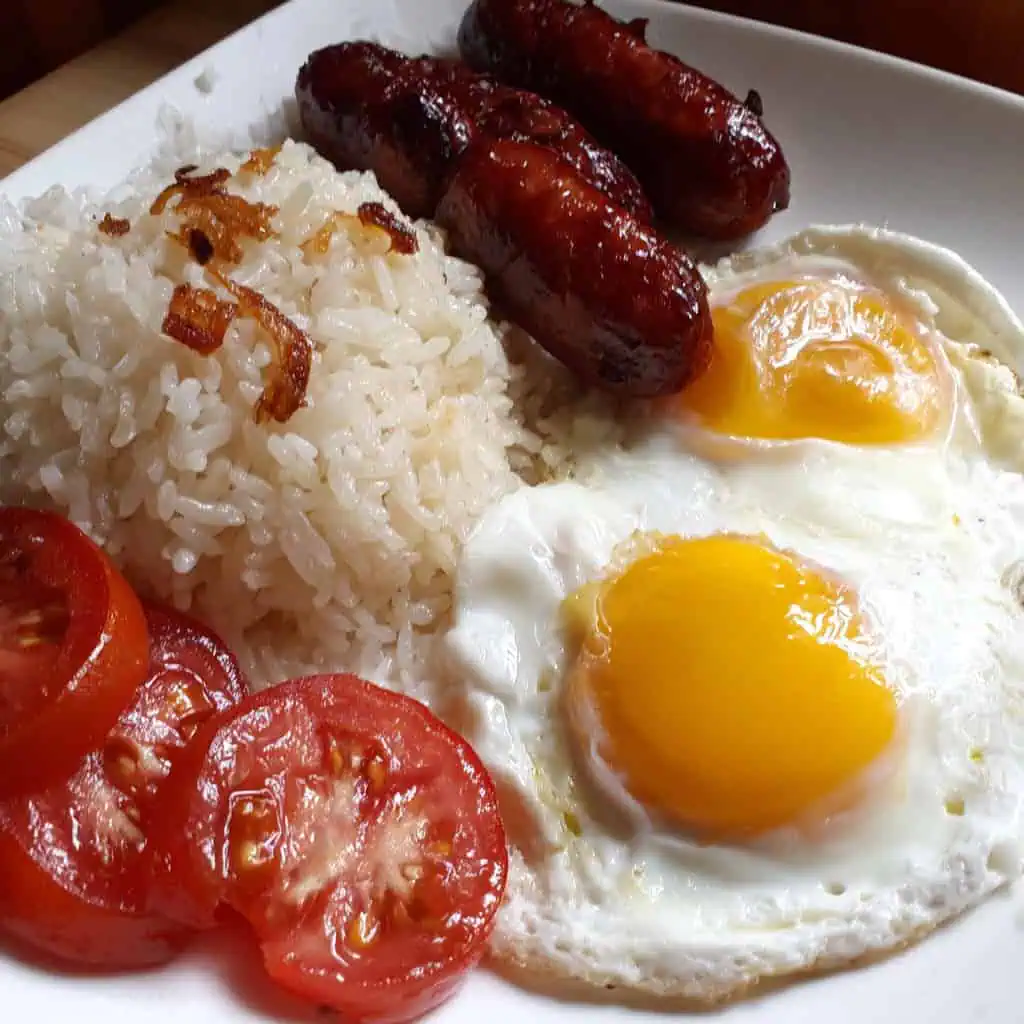
FAQ
Can I use brown rice?
Yes, but it will have a different texture and take longer to fry properly
What if I can't find longanisa?
Check Filipino grocery stores or order online - the flavor is worth seeking out
Should the egg yolk be runny?
Traditionally yes, but cook to your preference
Can I make this ahead?
Rice and longanisa can be prepped ahead, but fry eggs fresh for best results
Is this gluten-free?
Most longanisa contains some wheat, so check labels if this is a concern
How spicy is longanisa?
Most varieties are sweet rather than spicy, but flavors vary by brand
Related
Looking for other recipes like this? Try these:

Longsilog (Filipino Sausage with Garlic Rice and Fried Egg)
Ingredients
- 2 cups chilled white rice day-old works best
- 1-2 tablespoons minced fresh garlic
- ½ teaspoon salt
- 1 tablespoon cooking oil
- 5 pieces longanisa Filipino sausage
- 1 cup water
- 2-3 large eggs
- Fresh tomatoes or cucumber for serving optional
Instructions
- Start by heating your large frying pan over medium heat and add the longanisa with one cup of water. The water method is crucial here because it prevents the sausages from burning while ensuring they cook through completely.
- Bring the water to a boil and let it continue boiling while occasionally rolling the longanisa to ensure even cooking. This process takes about 8-10 minutes and allows the sausages to cook gently from the inside out.
- Once the water completely evaporates, you'll hear the sizzling change tone. Now the longanisa will start frying in their own rendered fat, which gives them that beautiful caramelized exterior. Continue rolling them for about 5 minutes until they develop a golden-brown, slightly crispy skin.
- While the longanisa finishes cooking, heat your second pan over medium heat and add the cooking oil. Add the minced garlic and cook until it turns golden brown and becomes fragrant and crispy, about 2-3 minutes.
- Add the chilled rice to the garlic and oil, pressing it down to break up any clumps. This initial pressing helps separate the grains and prevents them from sticking together in chunks.
- Stir the rice constantly to prevent scorching and ensure every grain gets coated with the garlic oil. Continue cooking for 5-7 minutes until the rice is heated through and has absorbed all the flavors.
- Season the rice with salt and continue cooking for another 5 minutes, stirring occasionally. The rice should be hot, fragrant, and lightly golden from the garlic oil.
- In the same pan used for longanisa (or a clean pan), fry your eggs sunny-side up. The key is to cook them over medium-low heat so the whites set completely while keeping the yolks runny and golden.
- Serve immediately by plating the garlic rice, placing the longanisa alongside, and topping with the fried eggs. Add fresh sliced tomatoes or cucumber on the side for a refreshing contrast.
Tips from Lola's Kitchen
- Always use day-old rice that's been refrigerated - fresh rice will become mushy and sticky when fried
- Don't skip the water-boiling step for longanisa; it ensures even cooking and prevents burning
- Keep the garlic moving in the pan to prevent it from burning and becoming bitter
- Press the rice down initially but then stir gently to avoid mashing the grains
- Cook eggs last so they're hot and runny when served
- If your longanisa seems to be browning too quickly, lower the heat and add a splash more water
The Story Behind Longsilog
Longsilog represents the heart of Filipino breakfast culture, born from the practical needs of hardworking Filipinos who needed a complete, satisfying meal to start their day. The name itself tells the story - it's a clever combination of "longanisa" (Filipino sausage), "sinangag" (garlic fried rice), and "itlog" (egg), creating the beloved portmanteau that Filipinos use for this iconic breakfast plate.
The dish emerged from the Filipino tradition of "silog" meals, where any protein paired with sinangag and itlog creates a complete breakfast. This concept became so popular that Filipino restaurants and carinderias (local eateries) began naming entire menu categories around it. You'll find tapsilog (with beef tapa), bangsilog (with bangus or milkfish), and dozens of other variations, but longsilog remains the most beloved and widely recognized.
Longanisa itself has deep Spanish colonial roots, arriving in the Philippines centuries ago and evolving into distinctly Filipino varieties. Each region developed its own longanisa recipe - from the garlicky Lucban longanisa to the sweet Vigan variety. When paired with sinangag, which transforms leftover rice into something magical with just garlic and oil, and topped with a perfectly fried egg, it became the breakfast that defines Filipino comfort food.
What makes longsilog special isn't just the flavors, but how it represents Filipino resourcefulness and family values. Using day-old rice prevents waste, while the combination provides complete nutrition and satisfaction that lasts throughout the morning. Today, longsilog has transcended its humble carinderia origins to become a symbol of Filipino cuisine worldwide, served in high-end Filipino restaurants and cherished in Filipino-American households as a connection to home.
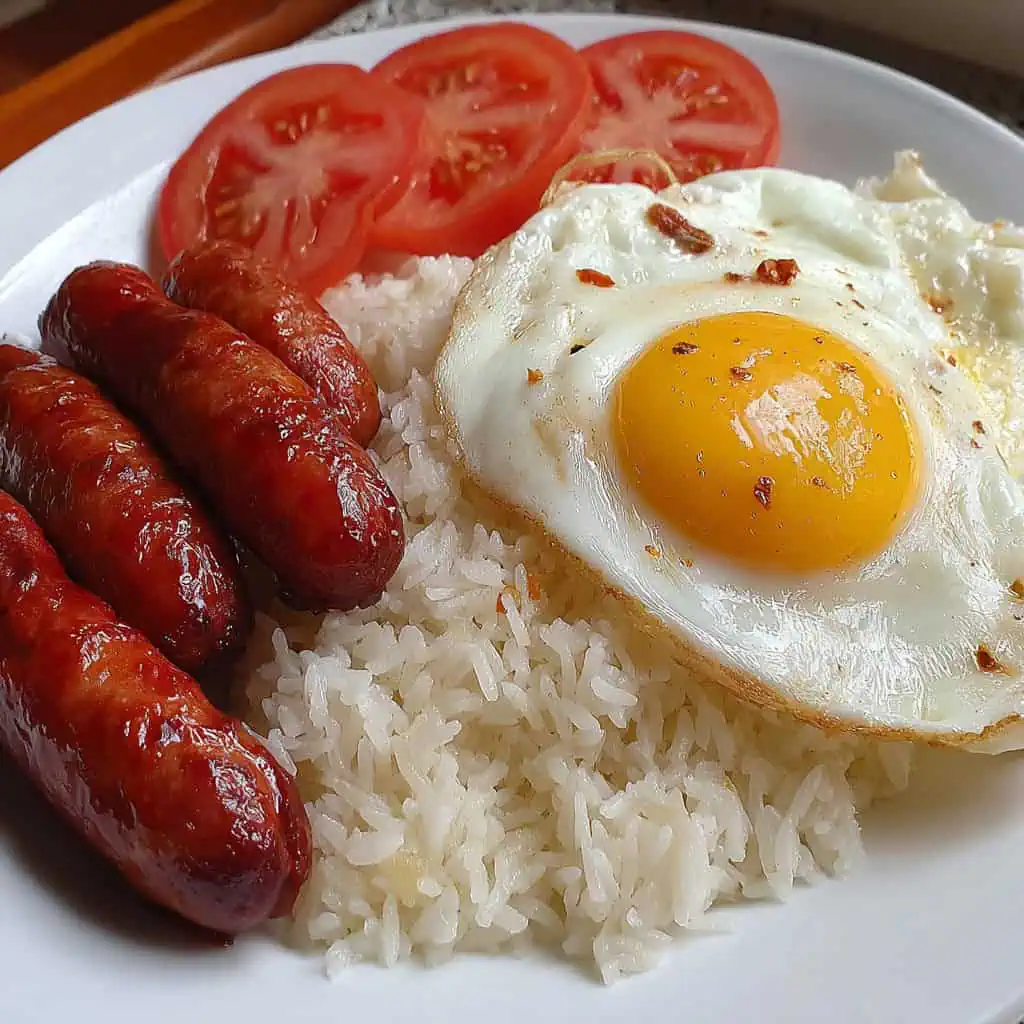

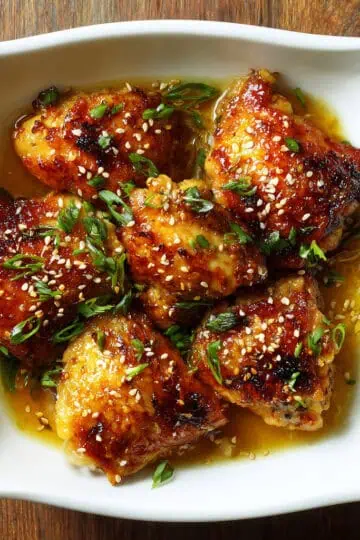
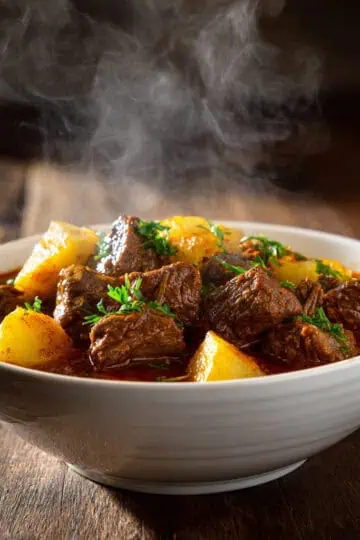



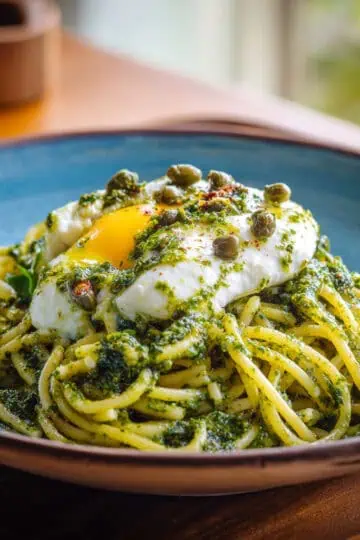
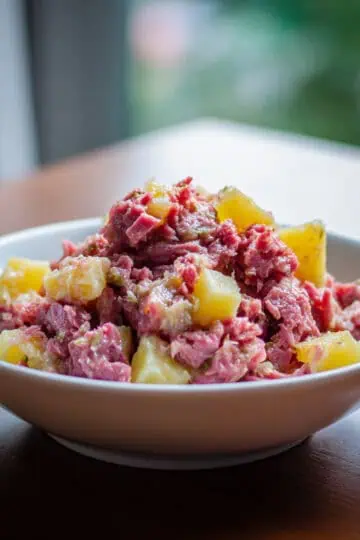

Comments
No Comments